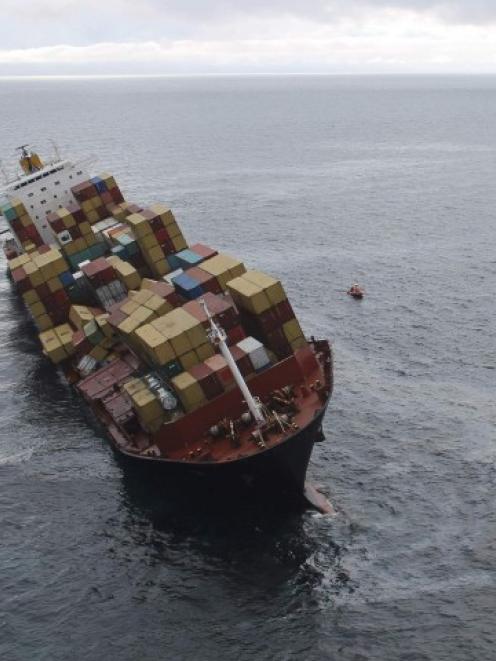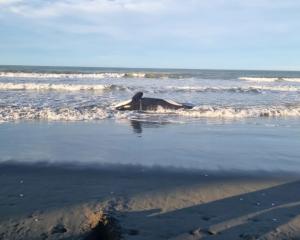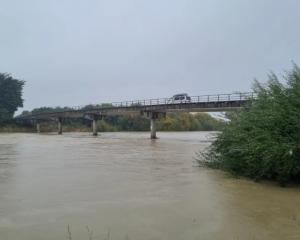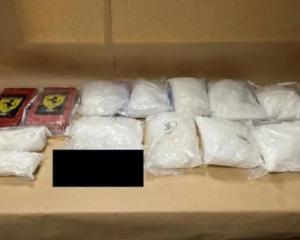
The wreck of container ship Rena will remain on Astrolabe Reef, off Tauranga. Environment Minister Nick Smith says further removal work at the reef could cause more environmental damage than if it were left alone.
In a decision released today, consent to "dump" the remains of the ship, its equipment and cargo on the reef as a result of the grounding of the vessel on October 5 in 2011, has been granted.
Application for consent to "discharge" any harmful substances or contaminants from the remains of the Rena, its equipment and cargo that may occur over time as a result of the degradation of the vessel, has also been granted.
An independent hearing panel was enlisted to consider and decide on the application, with the hearing taking 20 days.
The panel has released a 450-page document which outlines the conditions of the monitoring of the wreckage.
The Rena salvage cost more than $500 million. Crews recovered 1107 containers and 1467 cubic metres of oil from the ship.
Bay of Plenty Regional Council chief executive Mary-Anne Macleod said the consent application had been granted subject to an 'extensive suite of conditions' outlined within a 451-page document.
Ms Macleod said under section 120 of the Rescource Management Act, any person who made a submission now had 15 days to reappeal the decision to the Environment Court.
The council stated the Rena consent application had been particularly complex, with:
• 23 technical reports submitted with the application
• 151 submissions received in response to the application
• An independent hearing panel established to hear, consider and decide on the application
• The hearing took 20 days. Lists and transcripts of all submitters, technical advisers, expert witnesses, and information presented at the hearing is available on www.renaresourceconsent.org.nz

Environment Minister Nick Smith said the hearing panel's decision was "common sense". The resource consent process had been "exceedingly thorough" and he was satisfied that the right decision had been made.
Dr Smith said $500 million had been spent on the clean-up so far, and further removal work at the reef could cause more environmental damage than if it were left alone.
"The risk is that in trying to recover those last few pieces that we end up doing more damage to the environment than what we do to protect it."
Recovering the final pieces of the ship was also a risky exercise for the clean-up team, he said.
"We would always wish that the Rena disaster had not occurred, but you need to be pragmatic on the clean-up side about doing everything possible but not going to extreme lengths. This issue has been going on for many years. It needs to be brought to closure."
Briefings to the minister had shown that oil pollution was no longer being detected at the site, though the wreck was still having some impact on the reef environment.
Dr Smith said he did not have a view on whether an exclusion zone around the wreck should be removed or whether fishing should resume in the area.
The Government's submission on the resource consent application said it was not practical to remove the wreck, but that some remaining goods could be recovered from the site by the clean-up crew.
These [consents] include monitoring to detect adverse changes to the reef environment resulting from the exercise of the consents, and if the monitoring identifies that risks to human health, or significant adverse effects have occurred or are likely, those matters will be dealt under the conditions of consents and, addressed to the extent practicable through contingency measures to be taken by the consent holder.
A total of $6,350,000 will be paid out as a cash bond as part of resource consent conditions to leave the Rena wreck at Astrolabe Reef.
The independant panel which released its decision on the resource consent application this afternoon stated the money was a 20-year security, reducing to $2,900,000 for years 11 to 20.
In addition to the bond, the consent holder is to provide a surety in the form of an Irrevocable Letter of Undertaking ... from the Swedish Club (guarantor) in the sum of $5 million in favour of the council to provide for the undertaking of any contingency measures relating to the adverse effects arising during the term of the consents and for a period of up to 10 years after expiry.
- Bay of Plenty Times and NZME











